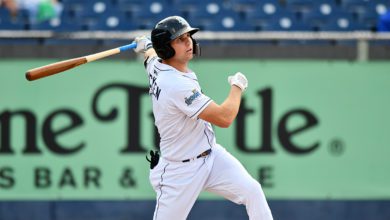
Major League Baseball will announce this year’s selections for the Baseball Hall of Fame on the 23rd. Todd Helton, who spent all 17 of his major-league seasons with the Colorado Rockies, is eligible once again. Last year, he received 72.2 percent of the vote, just 11 votes shy of the 75 percent needed for selection. Maybe this is the year he makes it. If I had a ballot, I’d be a tough voter, but I say he should get in.
A discussion of Helton’s Hall-worthiness can be as polarizing as discussing that of Barry Bonds, Mark McGwire or Sammy Sosa. However, in Helton’s case, the issue isn’t whether he is suspected of using performance-enhancing drugs. Helton has never been under any such suspicion. Rather, the issue is whether he was just a very good, but not great, hitter whose numbers were inflated by playing his home games in Coors Field.
A most friendly ballpark
For the uninitiated, Coors Field in Denver has long had a reputation as a hitter-friendly ballpark. The higher elevation combined with the thin, dry air causes batted balls to travel further and curve balls to flatten. Outfielders must play deeper to be ready to chase down deep fly balls. This results in singles dropping in front of them and baserunners taking extra bases.
Helton has had these advantages for half of the games he’s played in his major-league career. (In 2002, they began storing the baseballs in humidors before games there to neutralize the effects of the high altitude. The fences were moved back that same year. Both have worked somewhat to decrease offense but Coors Field remains an extremely hitter-friendly park.)
Helton’s credentials
The naysayers will scoff at his credentials, but I’m going to present them anyway. For his career, Helton slashed .316/.414/.539 with 369 HR, 1,406 RBIs, 61.8 WAR, 52.7 WPA and 1,848 RC. In 2000, he won his only batting title, leading the majors at .372. In that year, he also led the National League in hits, OBP and WAR and the majors in doubles, RBIs, slugging percentage, OPS and total bases. (I generally don’t cite OPS stats because the nuns at Immaculate Conception School taught me never to add two fractions with different denominators. However, I’m doing it here to point out one more category where Helton led baseball.)
Furthermore, Helton was a five-time All-Star, won four Silver Slugger Awards and three Gold Glove Awards as a first baseman, was runner-up Rookie of the Year in 1998 and received MVP votes six times.
So how much was he helped by Coors Field? For his career, he hit .345/.441/.607, 227 HR and 859 RBIs at home. Away from home, he hit .287/.386/.469, 142 HR and 547 RBIs. Yes, he was helped by Coors Field. But he was also hurt by Coors Field. How so, you ask?
What about RAS?
When the Rockies go on the road, their players must adjust to playing at lower altitudes. Scientists have proven the existence of Reverse Altitude Sickness (RAS) or Low Altitude Sickness. For one accustomed to a higher altitude, a sudden change to a lower altitude can result in headache, fatigue, insomnia, dizziness, nausea, higher blood pressure and shortness of breath. Among the ways to combat RAS are increased water intake, moderation of physical exercise (good luck with that when you’re in the lower altitude specifically to play baseball!) and a good night’s sleep (yeah, but you have insomnia!).
The Rockies are traditionally one of the worst road teams in the history of baseball. Their all-time road record is 950-1,480, a winning percentage of .391. That’s the equivalent of being 63-99 in a 162-game season. Last year, the Rockies were an astoundingly bad 22-59 away from home. The entire team underperforms on the road. Thus, there is both scientific and statistical evidence that if playing his home games in Denver helped inflate Helton’s home numbers, it also deflated his away numbers.
Let’s run some numbers
Comparisons of players of different eras are useless. The best way to judge the greatness of any player is to compare him to his peers. The following may not be the most scientific way to do it but allow me to explain the table below. I looked at 2000, Helton’s best year. I decided to compare him to the starting eight of that year’s NL All-Star Team, as well as the players who finished ahead of him in the MVP voting and won Silver Slugger Awards in the league. Due to overlap, that meant Helton would be compared to 11 other players. This seemed like a good enough selection of peers.
A neutral point of view
Then I took Helton’s prime years, 1998-2007. I isolated his neutralized statistics per Baseball Reference and did the same for the other 11 over the same period. Two of the 11 (Andres Galarraga and Barry Larkin) didn’t play every year in that period, so they were eliminated. You will note Helton places in the top three of every category except slugging, home runs and RBIs. But you’ll also recall this was also the “Steroid Era” in baseball. A “clean” player like Helton wouldn’t stand a chance in those categories.
| Player | BA | OBP | SLG | Hits | HR | RBIs | RC |
| Barry Bonds | .305 | .486 | .677 | 1,138 | 372 | 848 | 1,224 |
| Jim Edmonds | .275 | .374 | .521 | 1,197 | 256 | 754 | 855 |
| Vladimir Guerrero* | .314 | .380 | .563 | 1,762 | 332 | 1,033 | 1,187 |
| Todd Helton | .299 | .394 | .525 | 1,582 | 252 | 832 | 1,095 |
| Chipper Jones* | .298 | .397 | .539 | 1,510 | 290 | 894 | 1,095 |
| Jason Kendall | .285 | .360 | .373 | 1,492 | 56 | 474 | 679 |
| Jeff Kent | .292 | .363 | .514 | 1,545 | 248 | 954 | 982 |
| Mike Piazza* | .285 | .356 | .514 | 1,230 | 250 | 756 | 791 |
| Edgar Renteria | .281 | .339 | .400 | 1,545 | 102 | 621 | 751 |
| Sammy Sosa | .276 | .359 | .567 | 1,300 | 381 | 937 | 974 |
| Helton rank | 3rd | 3rd | 5th | 2nd | 6th | 6th | 3rd |
| *Hall of Fame |
“Neutralization” considers the ballpark factor, the number of games expected, league runs per game, whether the designated hitter was in use and a run scoring level of 688 runs per team, with the player’s Runs Created used as the baseline offensive level. Other stats are adjusted from there. Thus, among other things, it would eliminate the effects of playing in Coors Field. Got it? Confused? If you care to know more than that, it’s all right here. Interestingly, of the top 20 years that represent the best settings for hitters, Coors Field has five of them.
Or …
Then again, maybe it’s as simple as this. Do you think “Hall of Fame” when you hear his name? Did he scare the living hell out of you when he came to bat against your team with the game on the line? For me, Helton checks those boxes, too.





